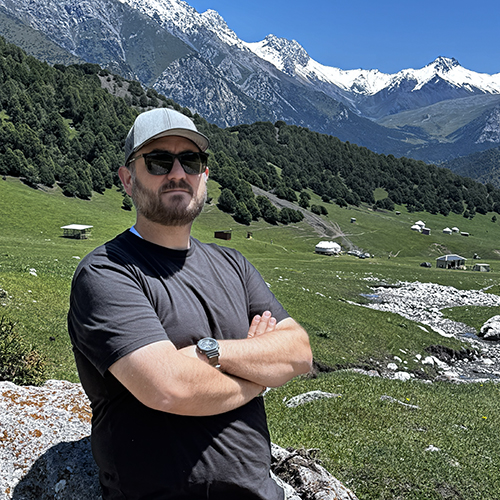Posttraumatic stress disorder. Borderline personality disorder. Implicit bias. Psychological terms that are familiar today were unknown when the UW Department of Psychology was founded one hundred years ago. Advances over the past century have been breathtaking, with UW faculty and alumni playing a key role every step of the way.
“Psychology now shapes the way all of us think about human behavior to a degree that is unimaginable from the standpoint of 1917,” says Robert Stacey, dean of the College of Arts & Sciences. “It influences the way we think about almost every sphere of human activity.”

The Department of Psychology had a modest beginning after splitting from the former Department of Philosophy and Psychology. Stevenson Smith served as the department’s first chair, a role he would hold for more than three decades. His close — and only — colleague was Edwin Guthrie, namesake of the department’s current home, Guthrie Hall.
By the 1950s, the department had grown to 23 faculty. The field of psychology had advanced significantly, in no small part due to the research of UW faculty and alumni. Of particular note is alumnus Neal Miller (1931), who worked with Professor Guthrie as an undergraduate and went on to discover biofeedback and do groundbreaking work on the influence of emotions on behavior. “That idea was quite novel at the time,” says department chair Sheri Mizumori. “His work laid the foundation for understanding how fear can control our behaviors. This led to studies of posttraumatic stress disorder and other anxiety disorders, which in turn led to treatment development. We’re quite proud that he’s one of our alums.”
Reflecting the growth of psychology as a field, a surge in hiring in the 1960s tripled the size of the UW Department of Psychology faculty and led to specialties like developmental, cognitive, social, biological, and clinical psychology. Along with specialization came new research tools. “Once psychologists started defining behavior more broadly and developing more tools for studying behavior, the field — and our department — really blossomed,” says Mizumori. “If you look back to see who was hired at that time, someone from each specialized area became a pioneer in their field.”

One of those hires was Robert Bolles, who discovered basic principles of how our biology can determine our motivation and learning. Another significant hire was Irwin Sarason, now an emeritus professor. Mizumori remembers using Sarason’s Abnormal Psychology textbook when she was an undergraduate at another college, as well as a statistics textbook by UW psychology professor Allen Edwards. Mizumori later transferred to the UW and was a little starstruck when she met the authors in person. “I thought, ‘Oh my gosh, these are the people I read about,’” she says.
If you look back to see who was hired, ...someone from each specialized area became a pioneer in their field.
Current students may have a similar reaction to their professors, who are routinely quoted as top experts in their field. Marsha Linehan has been featured in The New York Times and other media for developing dialectical behavior therapy, a very effective treatment for people at high risk for suicide or with disorders such as borderline personality disorder. Tony Greenwald’s research on implicit bias has been cited for years and was featured in mainstream media when Presidential candidates mentioned implicit bias during the 2016 Presidential debates. Other faculty have done an impressive array of groundbreaking work on topics such as addiction, animal behavior, diversity science, trauma and stress, language and communication, decision making, sensory perceptions, transgender youth, and cognitive and emotional development.
Psychology is currently one of the most popular majors at the UW, with an introductory course that attracts more than 3,000 students annually. About 1,000 undergraduates participate in research projects supervised by psychology faculty each year. And the department is among the largest recipients of federal research grants in the College of Arts & Sciences. It’s no wonder that UW Psychology has ranked among the top psychology departments in the nation for several decades.

Mizumori believes the department can do even more, especially as researchers in different specialty areas (there are now eight) collaborate to tackle challenging and complex questions from multiple perspectives. The department has identified three areas where it aims to make a lasting societal impact: promoting social equality, understanding behavior through brain science, and optimizing human potential by effectively preventing or treating mental health and behavioral problems and disorders. The department is seeking private support to help address these research priorities.
“Imagine a world free of psychological suffering,” Mizumori says. “Imagine a society free of injustice and inequities. Achieving such goals requires a richer understanding of why we think, feel, and act the way we do. We are now uniquely positioned to address all three of these difficult challenges by leveraging our collective strengths and increasing the interdisciplinarity of our research. In this way we can achieve a new level of impact on society, and on individuals within our society.”
Department founders Stevenson Smith and Edwin Guthrie would be amazed. And proud.
. . .
Learn how you can support the Department of Psychology.
More Stories

AI in the Classroom? For Faculty, It's Complicated
Three College of Arts & Sciences professors discuss the impact of AI on their teaching and on student learning. The consensus? It’s complicated.

A Sports Obsession Inspires a Career
Thuc Nhi Nguyen got her start the UW Daily. Now she's a sports reporter for Los Angeles Times, writing about the Lakers and the Olympics.

Through Soil Science, an Adventure in Kyrgyzstan
Chemistry PhD alum Jonathan Cox spent most of 2025 in Kyrgyzstan, helping farmers improve their soil—and their crops—through soil testing.